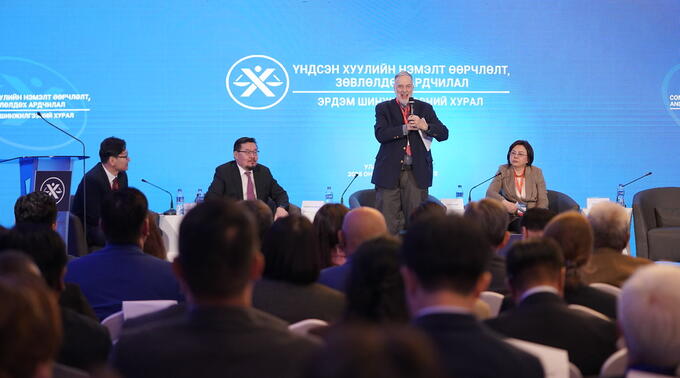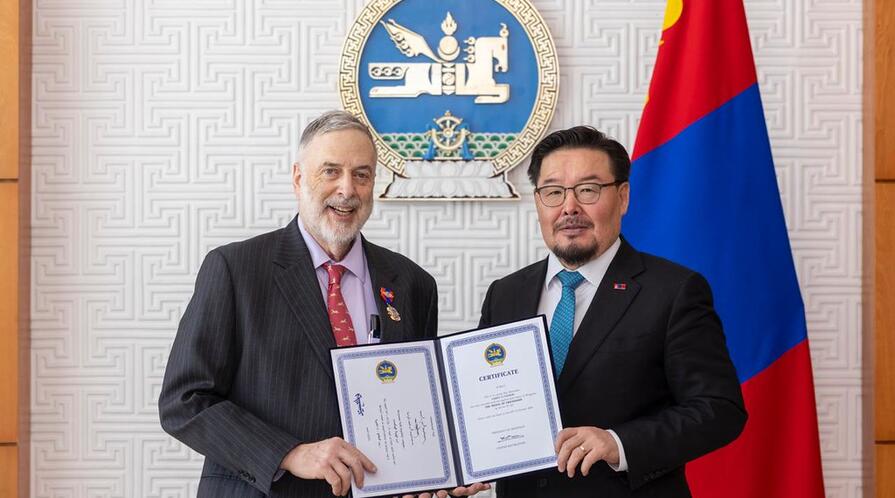Professor James S. Fishkin Awarded Friendship Medal of Mongolia
Please join us in congratulating Professor James S. Fishkin, Senior Fellow at the Freeman Spogli Institute for International Studies (FSI) and Director of the Deliberative Democracy Lab at the Center on Democracy, Development and the Rule of Law (CDDRL), on receiving the Medal of Friendship, Mongolia’s highest state honor, in recognition of his pioneering contributions to deliberative democracy. The award was decreed by the President of Mongolia, Ukhnaa Khurelsukh, on October 7, 2024, and presented to Fishkin by former CDDRL Visiting Scholar (2014-16) Zandanshatar Gombojav, now Chief of Staff to the President, during the Constitutional Amendment and Deliberative Democracy academic conference in Ulaanbaatar in May 2025.
Professor Fishkin, the Janet M. Peck Professor of International Communication at Stanford University, was honored for his work in introducing Deliberative Polling to Mongolia. This methodology, which gathers randomly selected citizens to discuss important political issues, has twice played a key role in shaping constitutional amendments in the country. The process is now required by law before the Parliament (the State Great Hural) can consider a change to the constitution, which it can then approve by 2/3 vote.
The award ceremony was part of a celebration of the 10th Anniversary of Deliberative Polling in Mongolia, marked by an international symposium that brought together experts from South Korea, Japan, China, France, Ireland, the United States, and Australia. These scholars shared insights on deliberative practices and democratic innovations in their respective countries. Key Mongolian decision-makers involved in the constitutional amendment processes also participated in the panels, reflecting on the role of public engagement in shaping governance.
During the event, Fishkin participated in a panel titled "Deliberative Democracy: Citizen Engagement and Best Practices", moderated by Alice Siu, Associate Director of the Deliberative Democracy Lab. In his presentation, Fishkin discussed how Mongolia has achieved a novel solution to a challenge facing many countries: how to amend the constitution by combining the deliberations of the people with those of their representatives.

Other notable presentations included discussions on public deliberation practices in South Korea, deliberative mini-publics in France, deliberative participatory budgeting in China, and Mongolia’s experience with deliberative democracy in a global context. One of the panelists for the latter topic included Bulgantuya Khurelbaatar, Vice Chairwoman of the State Great Hural of Mongolia, an alumna of CDDRL’s 2022 Fisher Family Summer Fellows Program.
On the second day of the event, Mongolian representatives also presented Fishkin with a Mongolian translation of his forthcoming book, Can Deliberation Cure the Ills of Democracy? (Oxford University Press, July 2025).
Siu emphasized the significance of the recognition: "Awarding this honor to James Fishkin is a testament to the profound impact his work has had on the field of deliberative democracy, not only in Mongolia but across the globe. His innovative approach has inspired countless individuals to engage in meaningful dialogue and foster a more deliberative society."
Gombojav added, “The Law on Deliberative Polling engages social science to help make a better constitutional process. It adds the voice of the people in a representative and thoughtful way. Our collaboration with Professor Fishkin has made all of this possible.“
The Friendship Medal underscores Fishkin’s lasting impact on democratic innovation, both in Mongolia and globally, as Deliberative Polling continues to help shape more inclusive governance practices around the world.
Read More

The award, decreed by President Ukhnaa Khurelsukh, is Mongolia’s highest state honor and recognizes Fishkin for his pioneering contributions to deliberative democracy.








